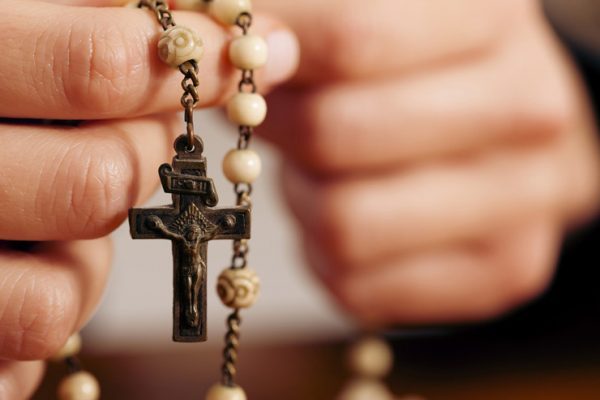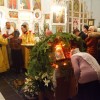Orthodoxy means “true glory” or “true faith.” We Orthodox think very highly of the word. Or do we? When it comes down to it, does Orthodoxy actually matter all that much to us (as it should)? Orthodox Christians in the west find themselves living among many different Christianities and it can sometimes be tempting to think that notwithstanding some of the more obvious differences, (icons, the Theotokos, fasting, worship, for example), all these Christian traditions share much the same faith as us. If you are of this opinion, then I am sorry to have to disappoint you, but it just isn’t true at all. How so?
I am going to consider this issue by looking at a case study which reveals the damage that heresy can do in our personal lives, our relationships and even to the society and world that we live in. It is a fictional story, but quite typical.
John and Mary go to an Evangelical Anglican Church. John is Orthodox (Greek tradition). Mary is Anglican. This is her second marriage, being a young widow with one teenage son (Ian, 15) still living at home. She now has two children with John, daughters, aged 5 and 7. John would prefer to go to his local Greek Church but his wife is a committed Anglican, and their children, although baptised in the Orthodox Church (with the exception of Ian), prefer the “lively worship songs”, as they put it, which are included in the church’s family service. Ian is very involved in the local youth group and is thinking eventually of becoming an Anglican minister. Does Orthodoxy then matter to John? Well, yes, but only in a remote nostalgic sort of way. It is some years now since he has attended Divine Liturgy, the last time was at Pascha in 2008. His stepson, Ian, will have nothing to do with what he considers to be the “stuffy incomprehensible worship” at his stepdad’s church which he has visited once, just after his stepfather’s marriage.
Ten years later ….
Neither John nor Mary now regularly attend the Anglican Church. John still hasn’t been back to the Orthodox Church since Pascha 2008 and Mary doesn’t like the new Vicar who is a woman. Mary is quite a conservative evangelical believer who maintains that a woman should not be in a place of authority within the Church over men. (This is the evangelical doctrine of the”headship of the male.”) Her two daughters, now 15 and 17 still attend on their own and are very active in the youth group. Ian, who shares his mother’s conservative outlook, has also left the church, disagreeing with what he believes to be the Anglican Church’s tolerance of homosexual partnerships. He has started attending a very conservative Baptist church that teaches pure Calvinism, in particular, the doctrines known as TULIP (from the first letter of each doctrine), namely:-
Total Depravity – As a result of Adam’s fall, all humanity, is dead in sins and therefore damned. Humanity’s nature is corrupt and utterly incapable of godliness.
Unconditional Election – Because man is dead in sin, he is unable to initiate a response to God; therefore, from eternity God elected certain people to salvation and others to damnation. Election and predestination are unconditional; they are not based on man’s response because man is unable to respond to God, nor does he want to.
Limited Atonement – Because God determined that certain people should be saved as a result of His unconditional election, He determined that Christ should die for the elect alone. All whom God has elected, and for whom Christ died, will be saved but the rest will be damned to hell for all eternity; again as determined by God’s sovereign will.
Irresistible Grace – Those whom God elected He draws to Himself through irresistible grace. God makes man willing to come to Him. When God calls, man responds. Man cannot choose to love God by his own choice and freedom.
Perseverance of the Saints – The precise people God has elected and drawn to Himself through the Holy Spirit will persevere in faith to the end. None whom God has elected will ever be lost; they are eternally secure even though they may sin grievously after election.
Although Ian is a pious and committed believer these doctrines trouble him. He begins to doubt that he is one of the elect, chosen by God for salvation. His sinful life (he occasionally resorts to prostitutes) troubles him greatly but his church tells him that he is unable to make any right choice and save himself. Ian enters a very dark period of depression, made much worse by the impact of these heresies on his mental health. His fragile relationship with his atheist girlfriend disintegrates. He seeks medical help for a latent depression which has now become the full blown clinical variety.
Five years further on, the two daughters are now at the same university, one just about to graduate but they have been unable to find an evangelical church they like nearby, so they have stopped attending church on the grounds that they believe in Christ and are saved, so what’s the point? Back home John and Mary now lead thoroughly secular lives. John sometimes thinks wistfully of his childhood back in Cyprus when he used to attend church with his Nana but this seems to him a very distant idealised time now. He hopes, nonetheless, that his wife or children will respect his wish for an Orthodox funeral if he dies first.
So, did Orthodoxy matter to John? Well yes, particularly earlier on, but for most of his adult life only in a nominal sort of way. He had certainly not been catechised in his youth and his grasp of the faith, therefore, had always been somewhat tenuous. Did Anglican evangelicalism then strike him as being similar to Orthodoxy? Well yes, mostly. He only saw differences in the worship style which often set his teeth on edge. Let’s face it. He attended the evangelical Anglican Church for the sake of his wife and family. When they stopped going, so did he. There is only one God after all and this was just a different way of being a Christian, it seemed to him. He did lament his stepson’s involvement in the Calvinist church because he could see how its refusal of human freedom and choice, its dark doctrines of divine election to salvation or damnation, did not feel right to him, but he couldn’t really say why.
Did Mary his wife ever consider Orthodoxy when the lady Vicar arrived? Well, no, why should she? Her husband rarely spoke of his childhood faith and she concluded that it could not have meant much to him in that case, so why should she consider it? John and Mary now spend a conventional Sunday together as most couples do in their street, getting up late, going to the gym occasionally, shopping at B&Q, taking a drive into the countryside; just the usual and normal things everyone does nowadays. Both still consider themselves as Christians, but obviously not of the fanatical sort whom they blame, quite rightly, for destroying Ian’s piece of mind. As for the two girls, well they eventually graduated and now have families of their own. Churchgoing, however, has become completely alien to all their families with the rest.
So, does Orthodox Christianity matter to you?
Does it matter enough for you to find out about it in more depth?
Does it matter enough for you to practice it as faithfully as you can, notwithstanding the distractions of modern life?
Does it matter enough for you to stay loyal to this faith no matter what challenges are presented to it by both family life and society as a whole?
And here’s the challenging question …
In the absence of an Orthodox church nearby would you be prepared to pray at home rather than pray with the heterodox?

















